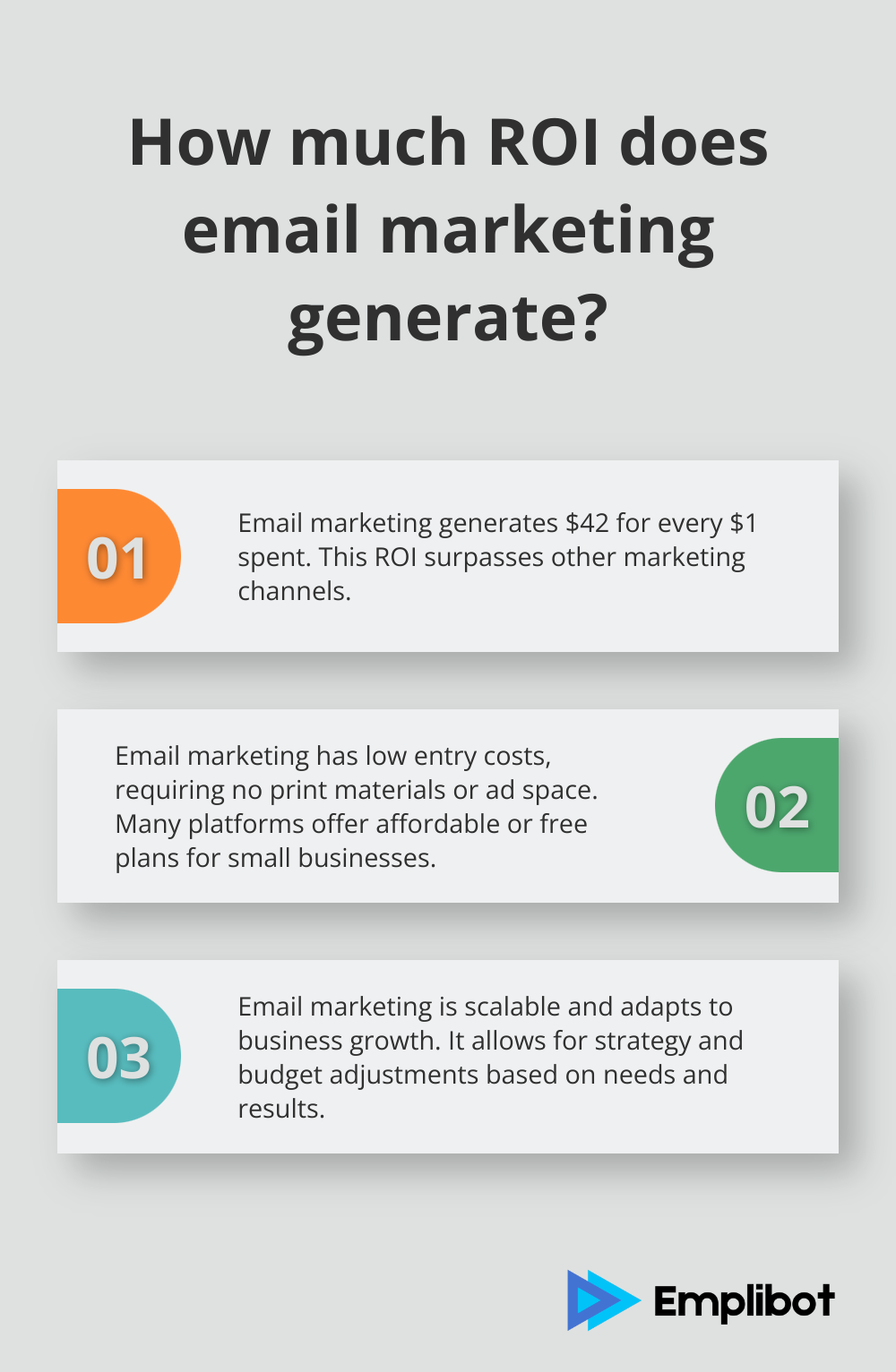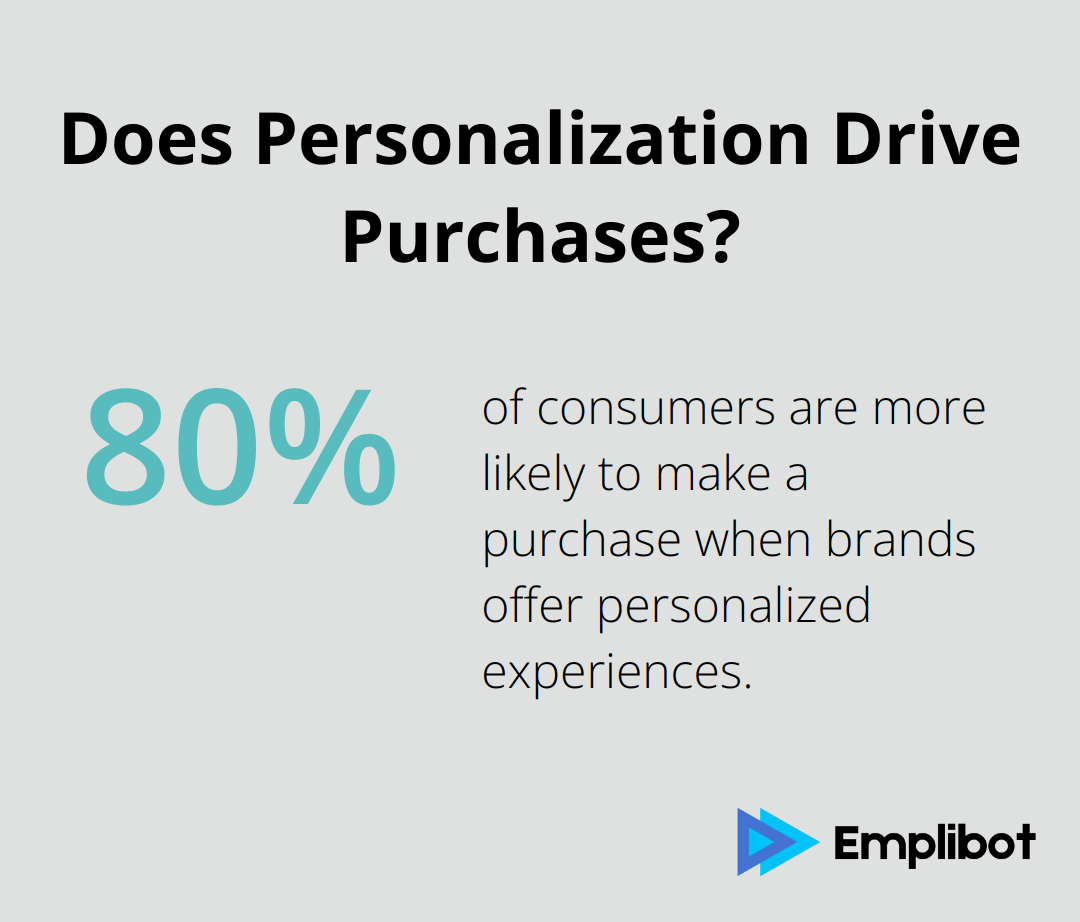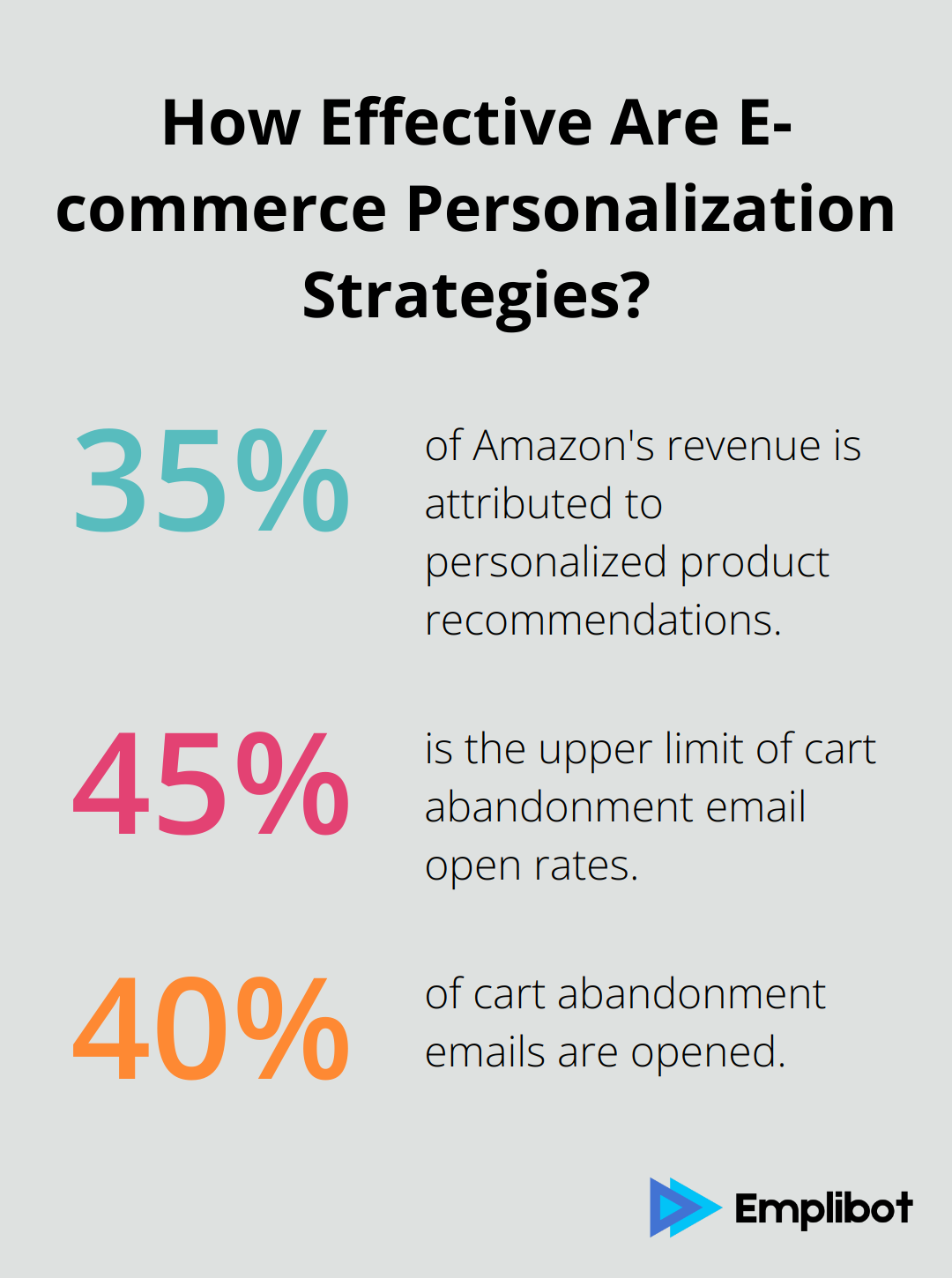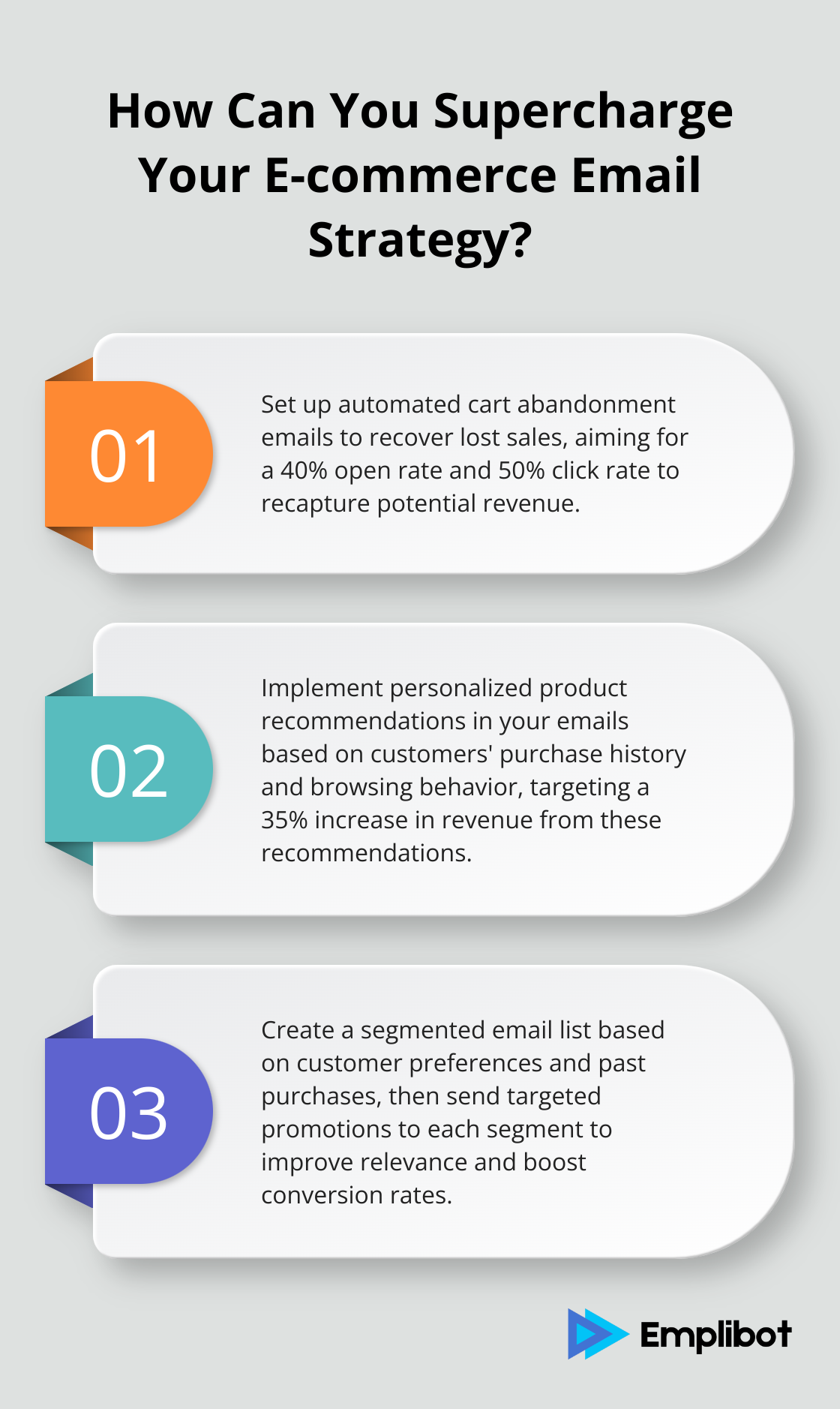Email marketing is a game-changer for small businesses. At Emplibot, we’ve seen firsthand how this powerful tool can transform a company’s growth trajectory.
Why is email marketing important for small businesses? It’s cost-effective, builds strong customer relationships, and drives sales like no other channel.
Let’s explore how you can harness its potential to boost your bottom line.
Contents
ToggleHow Cost-Effective is Email Marketing?
Email marketing stands out as a budget-friendly powerhouse for small businesses. It’s not just affordable-it’s incredibly efficient.
Unbeatable ROI
The numbers speak for themselves. Email marketing generates $42 for every $1 spent. This return on investment (ROI) far outperforms other marketing channels. For small businesses with tight budgets, this translates to more impact for every dollar spent.
Low Entry Costs
Unlike traditional advertising methods, email marketing doesn’t require a hefty upfront investment. You don’t need to pay for print materials, postage, or ad space. Most email marketing platforms offer affordable plans tailored to small businesses. Some even provide free options for businesses just starting out.
Scalability for Growth
Email marketing adapts as your business grows. You can start small and increase your efforts as your subscriber list expands. This flexibility allows you to adjust your strategy and budget according to your business needs and results.
Time-Efficient Solution
Time equals money, especially for small business owners. Email marketing automation tools can save you countless hours. You can set up campaigns to trigger based on specific actions or time intervals, ensuring your audience receives timely, relevant content without constant manual effort.
Measurable Results
One of the biggest advantages of email marketing is its measurability. You can track open rates, click-through rates, and conversions in real-time. This data allows you to refine your strategies quickly, optimizing your campaigns for better performance and higher ROI.

Email marketing empowers small businesses to compete with larger companies on a more level playing field. It’s a cost-effective strategy that delivers impressive results, making it an essential tool in your marketing arsenal. As we move forward, let’s explore how email marketing builds and nurtures customer relationships, another key benefit for small businesses.
How Does Email Marketing Build Customer Relationships?
Personalization: The Key to Customer Engagement
Email marketing transforms customer relationships through personalization. It goes beyond using a customer’s name in the subject line. Tailoring content to individual preferences and behaviors creates a powerful connection. A study by Epsilon reveals that 80% of consumers are more likely to make a purchase when brands offer personalized experiences. Small businesses can use data from past purchases, browsing history, and customer surveys to segment their email list. This segmentation allows for the delivery of content that speaks directly to each group’s interests and needs.
Consistent Communication Fosters Loyalty
Regular, valuable communication builds trust and keeps your brand at the forefront of customers’ minds. Small businesses should create a content calendar that balances promotional emails with helpful tips, industry insights, and exclusive content. This approach demonstrates to customers that you value their business beyond just making a sale.
Two-Way Communication Improves Products and Services
Email marketing opens a channel for customer feedback, which is invaluable for small businesses. Including surveys in emails or asking for feedback on recent purchases shows customers that their opinions matter. This information helps refine offerings and improve overall customer satisfaction.
Building a Community Around Your Brand
Email marketing allows small businesses to create a sense of community among their customers. Sharing user-generated content, customer success stories, or behind-the-scenes glimpses of your business (through email newsletters) can foster a deeper connection with your audience. This approach not only builds brand loyalty but also turns customers into brand advocates.
Providing Exclusive Value to Subscribers
Offering exclusive content, early access to sales, or special promotions to email subscribers makes them feel valued and appreciated. This exclusivity can significantly boost customer retention and lifetime value. Small businesses can use this strategy to reward loyal customers and incentivize new sign-ups, creating a virtuous cycle of engagement and growth.

Email marketing empowers small businesses to create personal, meaningful interactions with customers at scale. These strong relationships directly translate into increased sales and revenue. The next section will explore how email marketing drives these crucial business metrics.
How Email Marketing Boosts Sales
Email marketing serves as a powerful tool for small businesses to increase sales and revenue. When implemented strategically, it can significantly impact the bottom line.
Targeted Promotions That Convert
Email enables businesses to send highly targeted promotions to subscribers. While specific revenue figures vary, email marketing statistics show that most marketers report an average email open rate of 46-50%, with an average clickthrough rate of 2.6-3%. This underscores the importance of crafting offers that resonate with specific audience segments.

For example, a pet supply store might send cat-related promotions to cat owners and dog-related offers to dog owners. This level of targeting (based on customer preferences) ensures that promotions remain relevant and appealing to each recipient.
Recovering Lost Sales Through Cart Abandonment Emails
Cart abandonment presents a significant challenge for e-commerce businesses. Email marketing offers an effective solution to this problem. A well-timed cart abandonment email can recover a substantial portion of these lost sales.
Moosend reports that more than 40% of cart abandonment emails are opened, with rates reaching up to 45%. Additionally, 50% of cart abandonment emails are clicked. These numbers highlight the effectiveness of this strategy in recapturing potentially lost revenue.
Maximizing Customer Value with Cross-Selling and Upselling
Email marketing excels at cross-selling and upselling to existing customers. Businesses can analyze purchase history and browsing behavior to recommend complementary or upgraded products that genuinely interest their customers.
Consider a scenario where a customer recently purchased a camera. The business might email them about camera accessories or an advanced photography course. This approach not only increases sales but also enhances the customer’s experience by introducing them to relevant products or services.
Personalized Product Recommendations
Personalization extends beyond addressing customers by name. Email marketing allows businesses to tailor product recommendations based on individual preferences and past behaviors. This level of personalization (when done correctly) can significantly boost conversion rates.
Amazon, for instance, attributes 35% of its revenue to personalized product recommendations. While small businesses may not have Amazon’s resources, they can still implement personalized recommendations to drive sales effectively.
Time-Sensitive Offers and Scarcity Marketing
Email marketing provides an ideal platform for time-sensitive offers and scarcity marketing tactics. Limited-time discounts or exclusive deals create a sense of urgency, prompting customers to take immediate action. This strategy can lead to quick sales boosts and help clear inventory.
Final Thoughts
Email marketing stands as a vital tool for small businesses in today’s competitive landscape. Its unparalleled ROI, personalization capabilities, and potential to recover lost sales make it indispensable. Small businesses can level the playing field with larger competitors through targeted communication, fostering customer loyalty, and increasing lifetime value.

The measurable nature of email marketing enables businesses to refine their approach continually, ensuring optimal results. Those yet to harness its power should start now, while those already using it can always improve. Emplibot understands the challenges small businesses face in managing their marketing efforts.
We’ve developed a solution that automates content creation and distribution, allowing you to focus on running your business. While Emplibot isn’t a social media management platform, it complements your email marketing efforts by ensuring a consistent flow of high-quality content across all your digital channels. Email marketing remains a cornerstone of successful small business marketing strategies (why email marketing is important for small businesses).










 Rated Excellent 4.5
Rated Excellent 4.5